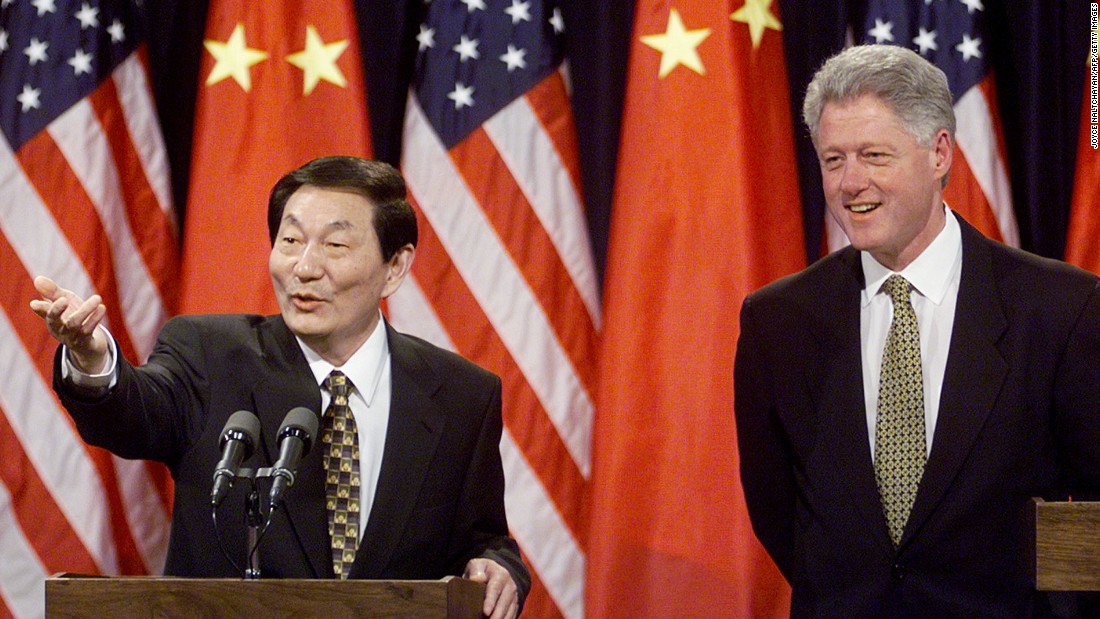Kuora: The importance of engaging with China

Pictured: Premier Zhu Rongji with President Bill Clinton.
With the Two Sessions set to wrap up, we turn again to politics, and this question, which Kaiser very recently answered — it was originally posted on Quora on Sunday, March 18, 2018:
Were Clinton-era (and earlier) engagement theorists naive to believe that economic reform would necessarily be a precursor to political reform and ultimate dissolution of the Leninist form of government?
No, I don’t think they were naïve, and, in fact, I believe they were correct — as long as we draw some parameters around what we’re calling “political reform.” If we insist that “political reform” meant, and can only mean, transition to a full multiparty electoral democracy, then, sure, I think “naïve” would fairly describe it. But I don’t think advocates of engagement believed that was in the cards any time soon. Especially after 1989 — and Clinton, as you’ll recall, was elected in 1992 — there were few illusions about the Party’s willingness to act with horrendous brutality if its hold on power were threatened.
Writing about this now, in the year 2018, and just a week or so after the state constitution was amended to remove term limits, it’s hard perhaps to remember what things looked like in the mid-2000s, before the decidedly illiberal turn that most China-watchers would date to roughly 2009. But at that time, a fair-minded assessment of political liberalization in China (again, by a standard that didn’t look at full democratization as the sine qua non of “political reform”) would have concluded that engagement had indeed moved China in the desired direction.
China had become substantially more deliberative and participatory. Civil society (if we use NGOs as a proxy for its health) was looking quite robust. The public sphere, which had simply never existed in China prior to the advent of the internet, was doing well. Internet censorship, especially compared with the years after 2013, was not nearly as severe. Many new media outlets — sure, ultimately state-controlled but operated mainly on market principles, and featuring quite aggressive investigative reporting — were flourishing. Rule of law, especially in the commercial sphere and in such areas as intellectual property protection, made significant gains in this period. Experiments in village-level democratic elections were under way in many provinces.
Engagement with the U.S. was certainly not the only factor in this, but drawing China into global trade regimes, permitting and encouraging more exchange at all levels (in business, in state-to-state, mil-to-mil, people-to-people, etc.) most assuredly did facilitate this progress. Still, credit is due to the Chinese leaders who encouraged this (Deng Xiaoping, Jiang Zemin and Zhu Rongji, Hu Jintao and Wen Jiabao) and, of course, to the ultimately irrepressible internal dynamic.
In the years since, we’ve tended to focus on how much of this has eroded, how much backsliding we’ve seen. That there has been movement in the “wrong” direction (I happen to think, anyway, that it’s the wrong direction) is not really deniable. But not all the gains have by any means been erased.
It worries me that right now we’re so quick to condemn proponents of engagement, and to draw the conclusion that China under the CCP is simply doomed to increasingly rigid authoritarianism. There have been chills and tightenings in the past; there’s no reason to assume that this will be substantially different. It may last longer, and it may be more forceful, but how we (the U.S. and other Western powers) react to it will most certainly be one factor in how long it lasts and how deep it goes.
Engagement remains our wisest general policy predisposition when it comes to China. The alternative is, to me, a reckless and shortsighted path. It may not yield everything we want, but it will move the ball down the field. And it may not feel as good, as Barack Obama once said. Speaking in Oslo after being awarded the Nobel Peace Prize (whatever you may think of the wisdom of that award!), he defended engagement, saying, “I know that engagement with repressive regimes lacks the satisfying purity of indignation.”
When it comes to China, Americans fall so easily into an old pattern. Whether out of Christian missionary zeal or our devotion to democratic principles, we nurture great hopes for China and create for ourselves unrealistic expectations about the country. Alas, these are not informed by any real grasp on China’s history, on its great inertia, its complex psychologies. Our hopes are inevitably dashed, and then we behave like spurned lovers, indignant and petulant. Tragically, I fear that we’re doing it again — and this time, China isn’t some distant object of our condescending pity, but instead a multidimensional peer. That’s something that the U.S. has not faced before, not in the entire time since its rise to superpower status after the Second World War.
Kuora is a weekly column.






